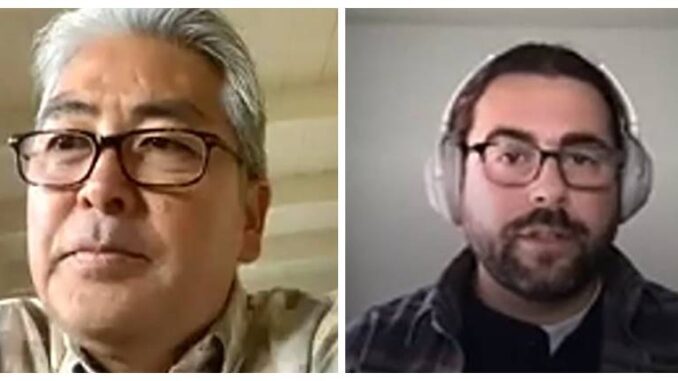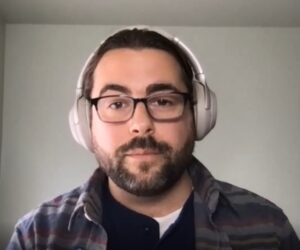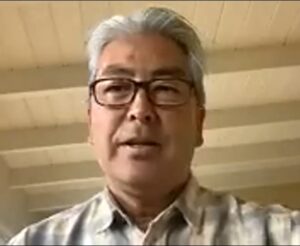
By Fraser Perkins —
The Palos Verdes Democrats held their monthly meeting by Zoom on October 17. Ann Nye chaired the meeting and introduced both the topic and the two guest speakers. The meeting theme was “Why is it so hard to accelerate California’s climate policy?”. The two speakers were Dr. Danny Cullenward and Assemblymember Al Muratsuchi. Both made presentations, followed by comments and a final summary.
 Dr. Cullenward holds several credentials in the Climate Community. He is the Policy Director at CarbonPlan, a research fellow at American University’s Institute for Carbon Removal Law and Policy, and the coauthor, along with David G. Victor, of Making Climate Policy Work.
Dr. Cullenward holds several credentials in the Climate Community. He is the Policy Director at CarbonPlan, a research fellow at American University’s Institute for Carbon Removal Law and Policy, and the coauthor, along with David G. Victor, of Making Climate Policy Work.
 Al Muratsuchi is the Assemblymember for the 66th District which includes Palos Verdes. He is the coauthor of AB 1395, the California Climate Crisis Act. This bill continues the arc of climate change mitigation initiated by former Governor Jerry Brown’s signing of SB 32, the California Warming Solutions Act which established 2030 California emission goals.
Al Muratsuchi is the Assemblymember for the 66th District which includes Palos Verdes. He is the coauthor of AB 1395, the California Climate Crisis Act. This bill continues the arc of climate change mitigation initiated by former Governor Jerry Brown’s signing of SB 32, the California Warming Solutions Act which established 2030 California emission goals.
Presentations
Dr. Cullenward
In Dr. Cullenward’s view, the biggest challenge to effective policy is the scope of the problem. It is a huge undertaking. “If we take seriously the scale of the Climate Crisis, it’s a really big thing to work on.” It will require fundamental changes in our economy and our lives. Cullenward contrasted Climate Change with single environmental issues. Climate change is broad, not narrow, and will affect all of us. It’s political with competing stakeholders, yet it will require an “all hands on deck” approach to solve. He noted how extraordinarily difficult it is “to convey the scale of the challenge to both the public and our leaders. The scale is enormous and overwhelming.”
Cullenward flagged three factors holding back progress:
- Self-deception – we’ve told ourselves it’s going to be easy
- We tend to exaggerate our successes
- We underestimate the complexity of the problem
In his view, we have lost five years of progress. Congress’s Budget Reconciliation Bill highlights some of the obstacles. Climate is one issue among many, the Democratic majority is razor thin and the window of opportunity may be brief. An overarching challenge is that each constituency within the Democratic Party believes that their specific view of what’s important should outshine all other viewpoints. A final complication is Senator Manchin’s opposition to the landmark climate policy contained within this Budget Bill.
Cullenward continued by noting that a carbon tax would be a step forward, but politics make this difficult. A carbon tax is highly visible to both individuals and industry and provides an easy target for opponents. Another hurdle is “regulatory capture” where the industries designed to be regulated gain control of the regulatory process and promote their own parochial interests at the expense of the public at large. At the state level, the cap-and-trade program, a second broad approach, has become mired in political compromise, with little progress over the past five years. Lack of progress in carbon taxation and cap-and-trade programs makes reaching carbon neutrality by mid-century challenging. The widespread perception that California is on track further saps the requisite energy to implement the broad changes.
Infighting between the environmental and labor movements complicates the dilemma. Initial cooperation between these groups on offshore wind development has given way to divergent views on renewable energy. Cullenward divided the labor movement into two sectors, the services and the building trades. The latter have been key allies in developing clean electricity, but strongly oppose broad policy goals such as cap-and-trade. The fossil fuel industry offers high paying jobs that don’t require a college degree; the building trades stand with the fossil fuel industry in opposing broad policy initiatives. One potential area of convergence between the environmentalists and the building trades is carbon capture, as it would employ the building trades in existing fossil fuel locations. Carbon capture, however, generates suspicion from a third interest group, social justice advocates. This latter group views carbon capture as a ticket for corporations to do business as usual, impeding progress in improving the environment in minority and low-income areas, home to many fossil fuel facilities and the source of local environmental degradation.
Cullenward cited lost time, the scale of the problem and internal divisions pitting allies against each other as factors impeding progress on climate policy. He concluded by noting there, “are no clear and easy answers.”
Assemblymember Al Muratsuchi
Assemblymember Muratsuchi complimented Dr. Cullenward for his advisory role to the California Legislature. Muratsuchi emphasized the massive scale and urgency of the problem. He noted that the recent report issued by the Intergovernmental Panel on Climate Change left no doubt that the Climate Crisis is caused by human emissions. “It’s code red for humanity.” Nations around the globe have coalesced to limit temperature rise to 1.5 degree Celsius. [Editor’s note: the temperature rise since the industrial revolution has been 1.1 degree Celsius.] He referenced climate change as a “boiling frog” situation. [Editor’s note: this metaphor holds that if a frog is placed in boiling water, it will attempt escape, but if placed in gradually warming water it will remain and become boiled alive.] The current drought and forest fires are examples of the Climate Crisis striking California.
Muratsuchi co-sponsored AB 1359. This legislation built on former Governor Brown’s approval of a legislative measure to reach net zero greenhouse gas emissions before 2045. AB 1359 sought to achieve a 90% emission reduction from 1990 levels by 2045. It set basic regulations and guidelines in the use of carbon capture. It offered reliable, verifiable and transparent policies on carbon offset plans, not just “greenwashing” as recently highlighted by the LA Times. The bill was defeated by the Senate; 12 Democrats abstained, dooming the measure. This stinging defeat mirrored the fights to limit hydrofluoric acid use in our local refineries, limit fracking and establish oil drilling setbacks. All regulations were strongly opposed by both the building trades and the fossil fuel industry. On the other end of the spectrum, AB 1359 was also opposed by social justice advocates as it allowed continued fossil fuel operation within low-income communities of color.
Comments to Questions by Al Muratsuchi (AM) and Danny Cullenward (DC)
The impending Glasgow Climate Summit
Muratsuchi is going, not as part of the US delegation, but as part of the California delegation which carries credibility both as the world’s fifth largest economy and as a leader in cap-and-trade legislation. Cullenward is not going. His view is that the summit is good for networking, but not for reaching agreements. “It’s an opportunity for leaders and nations to herald their progress.”
AB 1395
AM Though the measure died, it could be reconsidered next year.
Jobs Transition Support
DC This is a fairly common approach, yet a great deal of suspicion remains in fossil fuel communities such as Kern County.
Internal Divisions
DC There is a chasm between environmental activism groups close to the coast and inland areas, home to the fossil fuel industry. AB 1395 was opposed by the fossil fuel industry because in their view, it went too far. It was also opposed by social justice advocates who felt it didn’t go far enough, as it allowed fossil fuel activities to continue as normal. There is lack of trust at both ends of the spectrum. Climate legislation needs to generate trust within every constituency.
AM There is mistrust of the Air Resources Board by both the building trades and social justice advocates. He continued by citing two hopeful signs. A Massachusetts’ transition plan has gained support by public employee unions. Local steelworkers here are interested in the transition away from fossil fuels; they view the transition to renewables as the future and wish to participate in the process.
Net Zero
DC and AM It is easy to indulge in overly optimistic thinking on technology as an excuse for inaction. One aspect of AB 1385 was its 90/10 allocation. Ninety percent of progress was to be from emissions reduction and 10% from carbon removal. Regulators disliked the 90% reduction requirement; social justice advocates disliked the 10% carbon capture provision.
How to unite the party? How to unite environmentalists and union members?
AM How do you change the culture? He cited the flexibility shown by our local steelworkers as a hopeful sign. Muratsuchi reported that State Assembly Speaker Rendón twisted arms to get AB 1395 approved by the Assembly. He believes the Senate must be willing to buck the construction trades and demonstrate stronger leadership. Construction trades campaign donations are a key revenue source for Democratic candidates, making opposition to the interests of the building trades challenging.
DC He cited the lack of cooperation between the Senate and Assembly and continued by noting the powerful opposition to climate activism by the building trades. This runs against environmentalists who want quick and decisive action.
Power Outages
An audience member noted that both China and Europe have suffered power outages. China has ramped up coal production to supply power.
Self Interest
AM Electrical utility upgrades involve union workers, while rooftop installations do not. Unions are more likely to support electrical utility upgrades over rooftop installations.
Is carbon tax better than cap-and-trade?
DC Yes, “It’s harder to play games.” A carbon tax is transparent and more effective. Carbon tax dividends protect low and middle-income populations, yet any existing recipient of carbon taxes would oppose diversion of rebates to individuals.
Just Transition Legislation
AM An oil extraction tax would support retiring fossil fuel workers and provide retraining funds.
Should candidates accept donations from the natural gas industry?
The California Democratic Party has abstained from accepting oil money.
DC We need to electrify fixed buildings. The natural gas industry opposes this, leading to a slowdown of policy implementation.
AM The Public Utilities Commission (PUC) keeps extending the life of the Redondo Beach AES Natural Gas Plant despite climate and marine environment concerns. There are union jobs at natural gas plants.
Port Operations
AM This is an area where unions and environmentalists can work together. It is possible to protect the port while planning for the transition.
Final Summary
AM Politics, not policy, is the major challenge. Make Democratic club endorsements of candidates carefully. Hold non-supportive Democrats accountable. Remind candidates that there are constituencies besides the building trades.
DC The complexity of the issue is a major barrier. Harness the benefits of renewables without creating “tribal” differences. Prevent Climate Change from becoming a wedge issue separating constituencies, rather than working together.
Ann Nye thanked the two presenters for a probing, in-depth look at the factors blocking progress on Climate Change regulation.

Leave a Reply